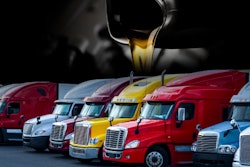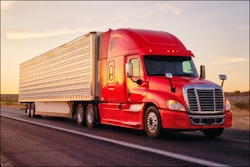Engines made by Detroit Diesel and its sister brand Mercedes-Benz will use selective catalytic reduction technology to comply with the 2010 diesel emission standards in the United States, says Chris Patterson, president and CEO of Freightliner Trucks.
Competing heavy-truck engine makers have said they plan to use existing technology – exhaust gas recirculation or, in the case of Caterpillar, its proprietary ACERT technology – to meet standards in 2007 and 2010. Detroit and Mercedes heavy-duty engines now use EGR.
The Detroit Diesel plans were mentioned by Andreas Renschler, head of DaimlerChrysler’s Commercial Vehicle Division, during a meeting in Germany. Both Detroit Diesel and Freightliner are owned by DaimlerChrysler.
“To clarify the remarks made in Papenburg,” Patterson says, “DaimlerChrysler sees selective catalytic reduction, using urea as a post-combustion catalyzing agent, as the optimal technical solution to the challenge of meeting the Environmental Protection Agency’s announced restrictions on NOx and particulate matter for 2010 and beyond. To this end, we are working with other engine producers, and with fueling infrastructure owners, to assure the agency that this approach meets both the letter and the intent of the regulation.”
Urea is a crystalline solid found naturally in human urine but also produced synthetically for industrial purposes, for example the making of plastics and fertilizer. SCR pumps urea into the exhaust stream, reducing the NOx back into nitrogen and oxygen. The system has a urea tank on the truck that must occasionally be refilled by the driver. Engine makers have shied away from SCR in part because of the requirements of creating sufficient nationwide distribution of urea.
Reducing the NOx outside the engine in this way allows a combustion process that is quite similar to that of pre-2002 engines. This means fuel economy, performance, and stress levels of engine and lubricating oil are more typical of earlier diesels.
“Like most other European manufacturers, DaimlerChrysler has opted for SCR technology and now occupies a leading position in this field,” Renschler said in Papenburg. “This year we have already successfully introduced SCR under the name BlueTec in Europe.”
“BlueTec has enabled us to reduce both fuel consumption and emissions. SCR is the best possible technology, and is suitable for worldwide use,” Renschler said. “It is superior to EGR, as a lower fuel consumption can be achieved.”
“In conjunction with government incentives, for example reduced road tolls in Germany, there are significant cost advantages for the vehicle owner, and particularly in the case of Euro-5 vehicles this has led to a high demand well before the date when the standard comes into force,” Renschler said.









